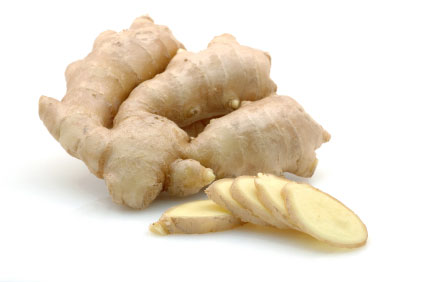

Health Benefits of GingerYou know you love it, but you may not believe the many health benefits of ginger! It has been used in Asian, Arabic, and Indian cultures as an herbal medicine since ancient times. For thousands of years, ginger has been used to aid digestion, nausea, menstrual cramps, and flu symptoms, but did you know it's been traditionally used to treat arthritis and heart conditions too? The REALLY interesting thing is that, more and more, studies are proving these traditional uses to be scientifically sound!
Nausea...Probably the most widely-known of the health benefits of ginger is it's ability to relieve nausea. In addition to helping relieve the symptoms of nausea from a common stomach bug, or flu, ginger can be used to combat nausea and vomiting from chemotherapy, pregnancy (morning sickness,) and post-surgery. Drinking Ginger ale for nausea is NOT just an "old wives' tale" afterall! Some studies have suggested that a safe and effective dose for pregnancy-related nausea and vomiting is 1 gram per day, taken no longer than 4 days. Some early studies have shown ginger to reduce the severity and duration of nausea during chemotherapy, although there was no effect on vomiting. Motion-Sickness...The travel industry is using ginger more and more to combat nausea caused by motion-sickness. Drink a cup of ginger tea (see below) or injest 1/4 teaspoon of powdered or 1/2 teaspoon of fresh ginger before a car or boat trip, ideally every 15 minutes for an hour before you travel. Repeat during your travels at the first sign of motion-sickness. Some studies have shown ginger to perform better than a placebo but not quite as effective as some prescribed medicications. However, ginger does not cause the common side effects of these medications: dry mouth and drowsiness. Migraines...1/3 teaspoon of powdered ginger or several slices of fresh ginger may help prevent a migraine from fully developing if taken at the onset of migraine symptoms. Results are still experimental, but why not give it a try? researchers in Denmark discovered attribute this benefit to ginger being able to block the effects of prostaglandins, which are substances that cause inflammation of the blood vessels in the brain, leading to migraines. Arthritis...Studies of people with osteoarthritis have shown ginger to aid in inflammation and pain, without the side effects of many anti-inflammatory drugs. High Cholesterol & Blood Clots...Numerous studies have suggested that ginger may have an effect on blood clots that is similar to that of aspirin. And unlike aspirin, ginger has a calming effect on the intestinal tract. Ginger also lowers Cholesterol levels by interfering with cholesterol biosynthesis. These effects may prevent blockages of the blood vessels, which can lead to heart attack or stroke. Ginger's antioxidant properties may also strengthen the heart muscle. Other Health Benefits of Ginger ...Studies are underway which aim to clarify ginger's anti-cancer and immune-system enhancing properties. Ginger may also enhance the effects of antibacterials, such as antibiotics by as much as 50%. Another cool tidbit I read somewhere (not yet substantiated) is that ginger digests parasites and their eggs. ALL herbs can cause side effects or trigger reactions when taken with other herbs or medicines. If taken is high doses, ginger has been known to cause mild heartburn or stomach upset. Do NOT take ginger if you have a bleeding disorder or if you are taking blood thinners, including aspirin. Contact your health care provider to be sure ginger is safe for you. Dosages...Children under 2 years of age should NOT use ginger. Ginger products can be in the form of fresh, dried, tablets, capsules, oils, tinctures, extracts, or prepared as tea. Most experts agree that ginger can be taken, by mouth, in small doses totalling 1 to 4 grams daily, including intake via foods such as ginger ale or ginger snaps. Adjust the dosage for a child, over two years, based on the child's weight compared to an adult of 150 pounds (70 kg.) For nausea, ginger may be taken orally: fresh ginger root (2 - 4 grams daily,) powdered (1/2 tsp every 4 hours as needed - not to exceed 4 doses daily,) in capsules (up to 4 grams daily,) or as a liquid extract (1.5 - 3.0 ml daily.) You may also chew on fresh ginger root when needed or brew ginger tea (below.) Inhaling: A drop of ginger oil or a few slices of fresh ginger root may also be placed in steaming water and inhaled. For arthritis: Ginger taken orally may help alleviate pain. Topical ginger oil can be rubbed into a painful joint or you may apply a warm compress of fresh ginger. Ginger Tea:To brew your own ginger tea, either drop a few slices of fresh ginger in boiling water or steep 2 tablespoons of freshly shredded ginger in hot water. Let cool and drink. Other natural cures:Have something that ginger won't cure? Check out this site we found that's all about natural remedies for better health. From oils to prevent stretch marks to the benefits of dark chocolate, this site is extremely informational!
References: University of Maryland Medical Center http://www.umm.edu/altmed/articles/ginger-000246.htm British Journal of Pharmacology ABC News in Science Bio-Medicine.org University of Sydney |
